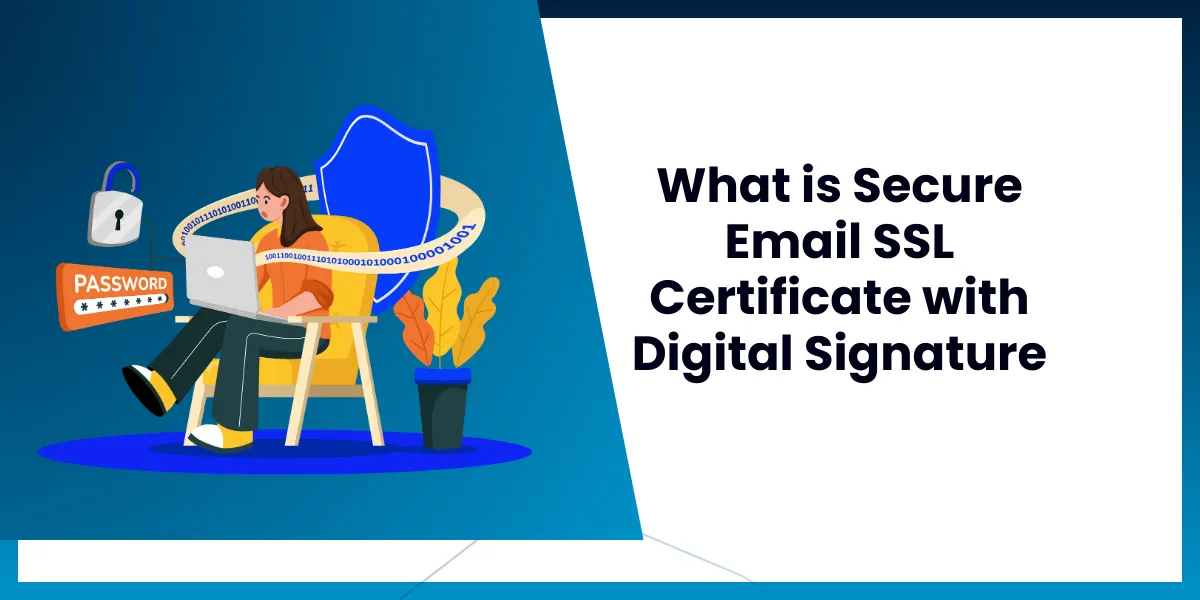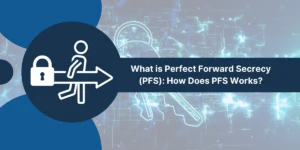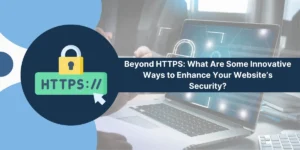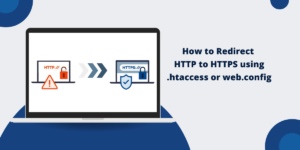What is a Secure Email SSL Certificate
A Secure Email SSL Certificate with Digital Signature provides encryption and identity authentication for email communications. It allows senders to sign emails to prove their identity digitally and ensures messages remain confidential through encryption. This type of certificate helps prevent email spoofing, interception, and tampering.
Email is one of the most popular forms of communication, both for personal and business use. However, standard email lacks security controls and is vulnerable to various attacks. Email messages are transmitted in plain text over the internet, allowing them to be intercepted and read by unauthorized parties. Senders can also disguise their identity, resulting in email spoofing and phishing attempts.
To solve these security issues, Secure Email SSL Certificates were developed. They utilize digital signatures for sender authentication and encryption for content confidentiality. With these protections, users can exchange sensitive information via email without worrying about eavesdropping or spoofing.
This article will explain what a Secure Email SSL Certificate is, how it works, its key features, and the benefits it provides.
Key Takeaways
- Secure Email SSL Certificates use digital signatures for sender identity authentication. The sender’s private key creates a unique signature attached to the email.
- Encryption encodes the email content so that only the intended recipients can read it. The certificate encrypts messages between email servers.
- The certificate’s validation by the recipient’s email server verifies the sender’s identity. The certificate links the sender to their public key.
- Preventing email spoofing is a key benefit. The validated digital signature proves the email is from the expected sender.
- Encryption provides confidentiality by securing the email content during transmission between servers. Only recipients can decrypt it.
- Tamper evidence is another advantage. Any changes to the encrypted email will invalidate the digital signature.
What is an SSL Certificate for Email?
An SSL certificate for email is a digital certificate that provides encryption and sender authentication for email messaging. SSL stands for Secure Sockets Layer and was the predecessor to the Transport Layer Security (TLS) protocol. The terms SSL and TLS are often still used interchangeably.
With a Secure Email SSL Certificate, all messages sent between two email servers are encrypted. This prevents unauthorized access while the email is in transit. The certificate also enables the sender to digitally sign each email, proving their identity to the recipient.
When you get an SSL certificate, it links a domain name to a public and private cryptographic key pair. The keys are mathematically related and used for the encryption and digital signature functions.
Sender Authentication with Digital Signatures
Digital signatures are a critical component of Secure Email SSL Certificates. They allow the recipient to verify the authenticity of the sender.
Here’s a simplified overview of how a digital signature for email works:
- The sender has a public and private key pair associated with their SSL certificate.
- To send an email, the sender’s email client software creates a hash or digital fingerprint of the message content.
- The software then encrypts this hash using the sender’s private key, which is the digital signature.
- The email and signature are transmitted to the recipient’s mail server.
- The recipient’s server decrypts the digital signature using the sender’s public key from their SSL certificate.
- If the decrypted hash matches a newly calculated hash of the email body, the signature is valid, and the sender is authenticated.
Encryption for Confidentiality
In addition to authenticating the sender, Secure Email SSL Certificates also encrypt the contents of the email. Encryption converts the message into a coded format that can only be decrypted by authorized recipients.
Encryption is applied between the sending and receiving email servers while the message is in transit across the internet. This ensures confidentiality, preventing the email content from being intercepted and read.
Different encryption algorithms are used, but they all rely on encryption keys to scramble the message during transmission. The receiving server must have the correct key to decrypt the email into a readable format once received.
Keys and algorithms are also used to encrypt the communications between email clients and servers. This adds further security, protecting the email path from end to end.
Key Features of Secure Email SSL Certificates
Secure Email SSL Certificates deliver a number of important security capabilities through their use of digital signatures and encryption:
- Identity authentication: Digital signatures verify the sender’s identity, preventing spoofing.
- Message confidentiality: Encryption keeps email content secure and private while in transit.
- Tamper evidence: Changes made to the encrypted email invalidate the signature.
- Non-repudiation: The digital signature proves the sender transmitted the message.
- Domain validation: The SSL certificate links the sender’s identity to the domain.
- Compatibility: Wide support across email clients, servers, and operating systems.
- Scalability: Can secure communications for individual users or entire organizations.
- Automated renewal: Certificate authorities manage expiration and renewal processes.
These features work in conjunction to deliver a complete email security solution encompassing authentication, privacy, and integrity.
What are The Benefits of Secure Email SSL Certificates
Implementing Secure Email SSL Certificates provides a number of valuable benefits:
- Prevent Email Spoofing & Phishing
- Ensure Email Privacy & Confidentiality
- Maintain Message Integrity
- Provide Legal Non-Repudiation
- Improve Email Deliverability
- Comply with Regulations
- Support Business Needs
1. Prevent Email Spoofing & Phishing
Secure email SSL certificates prevent spoofing attacks by requiring valid digital signatures. Spoofing occurs when a malicious sender impersonates a trusted party, often to distribute malware or gain access to sensitive data through phishing.
With SSL Certificate authentication, recipients can verify emails are truly from the expected sender, thwarting spoofing attempts. Their identity is cryptographically proven through the verified digital signature.
2. Ensure Email Privacy & Confidentiality
Standard email is transmitted in plain text, making it easy for attackers to intercept and read messages during transmission. Secure Email SSL Certificates utilize encryption to keep email content private.
Encryption encodes the message such that only the intended recipient can decrypt it with the correct cryptographic key. This prevents unauthorized parties from accessing the email content while in transit between networks.
3. Maintain Message Integrity
Secure Email SSL Certificates also utilize hashing and digital signatures to protect email integrity. Alterations made to an encrypted message will invalidate the signature.
This allows recipients to detect tampering or corruption of the email content. If changes occur, the recipient will find that the decrypted hash value does not match the newly calculated hash.
4. Provide Legal Non-Repudiation
With standard email, senders could claim they didn’t actually send a particular message. Secure Email SSL Certificates prevent this repudiation through the validated digital signature mechanism.
The signature mathematically links the message content to the sender’s private key. This irrefutably proves the sender transmitted the email contents, providing strong evidence for legal proceedings.
5. Improve Email Deliverability
Encrypted emails from verified domains are less likely to be blocked or flagged as spam. This improves deliverability, ensuring intended recipients reliably receive emails.
SSL encryption also allows emails to safely include sensitive information without triggering security filters. This further aids deliverability rates.
6. Comply with Regulations
Certain regulations and standards, such as HIPAA, require the use of security controls for email, such as encryption. Secure Email SSL Certificates help organizations comply with these policies for industries such as healthcare.
7. Support Business Needs
Effective communication is crucial for businesses. Secure Email SSL Certificates allow organizations to exchange sensitive documents and data safely through email.
Encryption and signature verification build confidence in email as a reliable means of business communication without sacrificing security.
How to Get a Secure Email SSL Certificate
There are a few steps involved in getting a Secure Email SSL Certificate:
- Choose a Reputable SSL Certificate Provider
- Generate a Public/Private Key Pair
- Submit a Certificate Signing Request (CSR)
- Get the SSL Certificate Issued
- Configure Email Clients & Servers
1. Choose a Reputable SSL Certificate Provider
Research and select a trusted certificate authority (CA) to purchase your SSL certificate from. Look for providers that offer identity validation and unlimited re-issuance. Top options include DigiCert, Entrust, and GlobalSign.
2. Generate a Public/Private Key Pair
Public and private keys will be used to create digital signatures and encrypt communications. The process for generating this key pair depends on the email environment.
For services like Gmail, the CA automatically creates keys. However, for other mail servers, you may need to generate keys manually and submit the public key to the CA.
3. Submit a Certificate Signing Request (CSR)
To request an SSL certificate, the CA needs a CSR file. This contains your public key and information proving your organization’s identity. Creating the CSR differs by environment.
4. Get the SSL Certificate Issued
After validating your details and signing the CSR, the CA will issue the SSL certificate. This certificate contains your public key and identifying details for your domain. Install this certificate on your mail servers.
5. Configure Email Clients & Servers
Finally, configure your email servers and clients to use the SSL certificate. Enforce TLS encryption for transport between servers. Verify clients can validate signatures and encrypt emails via the SSL certificate.
Following these steps results in a fully secured email environment with sender authentication and encryption in place. Contact your CA’s support for guidance during the implementation process.
The Best Secure Email SSL Certificates Providers
Many certificate authorities and cybersecurity vendors offer Secure Email SSL Certificates. Here are some top options:
- DigiCert CertCentral Email Certificates
- Entrust Datacard Email Certificates
- GoDaddy Email Certificates
- Globalsign Email Certificates
- Sectigo Email Certificates
DigiCert CertCentral Email Certificates
DigiCert is the world’s leading SSL provider. Their CertCentral platform allows you to purchase and manage Secure Email Certificates validated for top email providers like Microsoft 365, G Suite, and Zimbra.
Entrust Datacard Email Certificates
Entrust Datacard offers email security through TLS/SSL certificates for Microsoft Exchange and other mail servers. Their certificates can secure on-prem, hybrid, and cloud-based email.
GoDaddy Email Certificates
In addition to their popular domain registrar services, GoDaddy sells TLS/SSL certificates that work with Microsoft Exchange, Office 365, and Gmail servers. Different validation levels are available.
Globalsign Email Certificates
Globalsign sells Organization Validated and Extended Validation certificates to implement encryption and digital signatures for corporate email systems.
Sectigo Email Certificates
Sectigo has a wide range of TLS/SSL certificates for securing email communications. Products are tailored to environments like Microsoft Exchange, Office 365, and Postfix/Sendmail.
Final Thoughts
Secure Email SSL Certificates play a crucial role in protecting business and personal communications against email threats. By utilizing digital signatures for authentication and encryption for privacy, they prevent spoofing, interception, and tampering.
Validating the sender, encrypting the content, and checking integrity gives recipients full confidence in received emails. The privacy, authenticity, and non-repudiation provided by Secure Email SSL Certificates make email a trustworthy means of sensitive communication.
FAQs about Secure Email SSL Certificates
How do digital signatures in email work?
Digital signatures for email involve the sender encrypting a hash of the message with their private key. The recipient decrypts this signature using the sender’s public key and compares the result to a newly calculated hash. If they match, the signature is valid, proving the sender’s identity.
What keys are used in Secure Email SSL Certificates?
Secure Email SSL Certificates utilize a public and private key pair associated with the sender’s identity. The private key creates the digital signature, and the public key decrypts the signature for identity verification. Encryption keys secure the email contents.
Can you tell if an email was digitally signed?
Most email clients display an indicator, such as a ribbon icon, when validating a digital signature from a Secure Email SSL Certificate. The signature validity is shown before the email content is displayed.
How does encrypting email work?
Email encryption transforms the message into a coded format using a randomly generated symmetric key. The symmetric key is then encrypted with the recipient’s public key. Only the recipient’s private key can decrypt the symmetric key to unlock the message.
What is a Certificate Signing Request (CSR)?
A CSR is a file generated by the certificate applicant containing their public key and details about their organization. It is submitted to the certificate authority (CA) when requesting an SSL certificate. The CA verifies and signs the CSR, returning the new certificate.
What is domain validation for SSL certificates?
Domain validation proves ownership and control over the domain name associated with an SSL certificate. This ensures senders are authorized to use the domain for secure email. Validation methods include requiring control of the domain’s DNS records.
Do Secure Email SSL Certificates slow down email?
Modern servers and email clients are performant enough that users will notice little to no difference in email speed when using transport layer encryption via SSL certificates. The benefits provided outweigh any potential delays from crypto processing.

Priya Mervana
 Verified Web Security Experts
Verified Web Security Experts
Priya Mervana is working at SSLInsights.com as a web security expert with over 10 years of experience writing about encryption, SSL certificates, and online privacy. She aims to make complex security topics easily understandable for everyday internet users.



